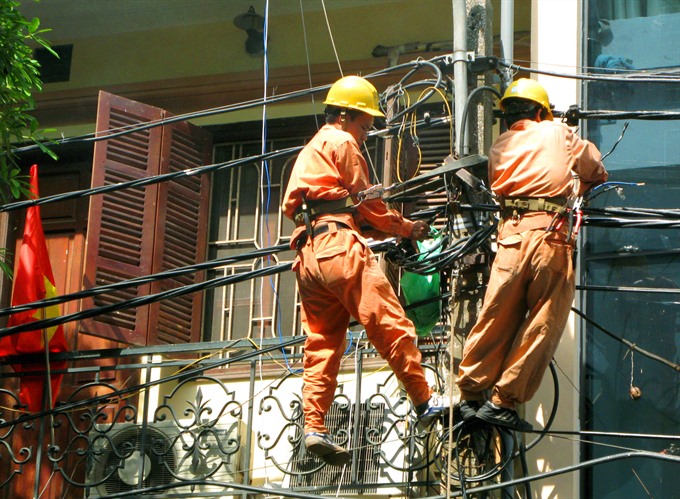 Society
Society

Last month, while Kiều Văn Mạnh was delivering timber in the capital city’s Thạch Thất District, the planks of wood he was carrying came into contact with the overhead power lines and caused a 23-minute power outage for the two districts of Thạch Thất and Ba Vì.
 |
| Electricians renovate a low-voltage power grid in Nguyễn Du Ward, Hai Bà Trưng District, Hà Nội. — VNA/VNS Photo Ngọc Hà |
HÀ NỘI — Last month, while Kiều Văn Mạnh was delivering timber in the capital city’s Thạch Thất District, the planks of wood he was carrying came into contact with the overhead power lines and caused a 23-minute power outage for the two districts of Thạch Thất and Ba Vì.
An unofficial survey in Hà Nội revealed several instances in which high-voltage power lines had violated safety corridors, threatening the electrical supply for the city.
In January, an unidentified unit was caught moving trees in front of the Phạm Văn Đồng gate of the Ministry of Public Security, which is within the ‘safety corridor’ of an underground power cable that runs from Chèm Village in Từ Liêm District, through Nghĩa Đô Ward in Cầu Giấy District to Mỹ Đình Commune in Từ Liêm District.
A similar case was reported on the same day in Hà Đông District. It was discovered by the Hà Nội High Voltage Power Grid Company while the company was examining the installation of a sewer in the district’s Phú La Ward.
The forms of violation vary, including illegal construction of houses and buildings, labourers working near power grids, as well as haphazard installation of tents, roofs and fences that might be blown away during storms and hit the grids, the company said.
Several construction owners did not take responsibility for complying with the safety regulations for high-voltage power grids, according to the company. Several of them did not announce or contact the company for coordination when digging up roads in the areas of power grid safety corridors, it said.
According to Nguyễn Văn Tú, director of the Fanci Law Limited Company, the installation of structures such as balconies near power lines is a violation of regulations on power grid safety corridors.
It does not only affect the national power grid but also endangers the lives of residents, he said.
In 2013, some electrical poles in the Tam Chúc Tourism Site in Hà Nam Province were soaked in water due to the construction of an artificial lake within the safety corridor of the site’s high-voltage power grid.
The poles were at high risk of collapse after their bolts, braces and wires rusted due to the water, posing a danger to local residents and potentially causing power outages for the province and parts of the capital city, according to Đỗ Đình Dũng, an official from the Power Transmission Company 1 under the National Power Transmission Corporation (EVNNPT).
The Hà Nội High Voltage Power Grid Company has installed barriers around low power grids on high-traffic roads and placed warning signs for vehicles, as well as collaborating with concerned city authorities to promulgate regulations on protecting power grid safety corridors, the company said.
Violations of safety regulations for power grids would face fines of between VNĐ1-50 million (US$) as regulated in Decree No. 134, issued by the Government in 2013, depending on the severity of the violation, according to lawyer Nguyễn Văn Tú from the Fanci Law Limited Company.
Violations that are particularly severe, and the repetition of violations after civil fines have been imposed, will be subject to criminal charges, Tú said.
However, the most severe punishment available for these cases is 10 years imprisonment, which is considered rather ‘light’ for violations that result in fatalities, he said. — VNS




